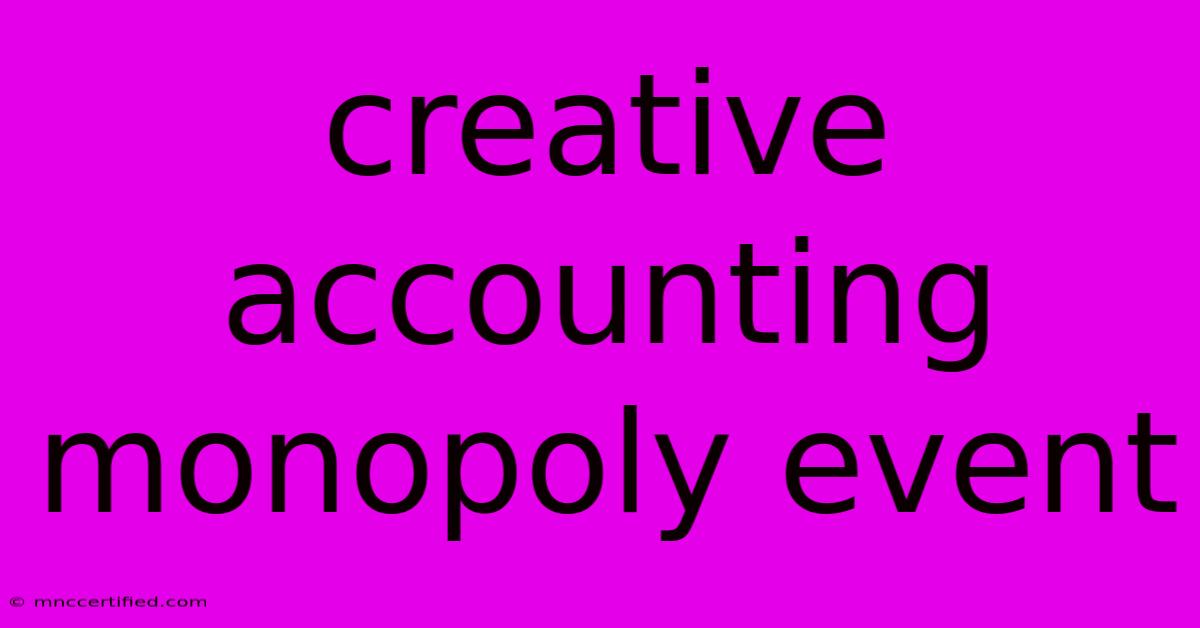Creative Accounting Monopoly Event

Table of Contents
Creative Accounting: A Monopoly Event – Navigating the Risky Game of Financial Reporting
The classic board game Monopoly teaches us about shrewd property acquisition and strategic bankrupting. But what if we applied the same cutthroat strategies to financial reporting? This article explores the concept of "Creative Accounting: A Monopoly Event," examining how the seemingly harmless game mirrors real-world scenarios where companies manipulate financial statements to gain an unfair advantage. We'll dissect the risks, rewards, and ethical implications involved.
Understanding Creative Accounting
Creative accounting isn't about outright fraud, though it can certainly lead there. It's about exploiting loopholes and bending accounting rules to present a more favorable financial picture than the reality. Think of it as playing Monopoly with a flexible rulebook – you might stretch the definition of "rent" or creatively interpret the "Free Parking" space to your benefit.
In the real world, this can involve techniques like:
- Aggressive revenue recognition: Booking revenue prematurely, before it's actually earned. In Monopoly terms, this is like claiming rent before a player lands on your property.
- Underestimating expenses: Delaying the recognition of expenses or understating their value. Similar to secretly stashing away Monopoly money to avoid paying others.
- Manipulating depreciation: Using accelerated depreciation methods to reduce reported profits in one period and boosting them in another. This is like strategically selling off properties at advantageous times.
- Off-balance-sheet financing: Hiding debt or liabilities outside the main financial statements, masking the true financial burden. This is the equivalent of secretly borrowing money from other players without it showing on your balance sheet.
The Monopoly Analogy: A Risky Game
Monopoly provides an excellent analogy for the risks associated with creative accounting. While short-term gains might be tempting (just like acquiring a prime property), the long-term consequences can be devastating.
- Detection and penalties: If your creative accounting is discovered (like another player catching you cheating), the consequences can be severe. Real-world penalties include hefty fines, legal battles, and reputational damage, potentially leading to bankruptcy (game over!).
- Loss of investor trust: Investors rely on accurate financial statements to make informed decisions. Creative accounting can erode this trust, leading to a loss of investment and market value. In Monopoly, this is akin to other players refusing to trade with you, crippling your chances of winning.
- Ethical considerations: Creative accounting can cross the line into outright fraud. While bending the rules might seem harmless in a game, in the real world, it's a serious ethical violation.
Why Companies Engage in Creative Accounting
The motivations behind creative accounting are varied:
- Meeting earnings expectations: Companies might engage in creative accounting to meet Wall Street's earnings expectations, boosting their stock price and executive compensation.
- Securing financing: Presenting artificially inflated profits can make it easier to secure loans or attract investors.
- Avoiding taxes: Creative accounting can be used to reduce tax liabilities, increasing profitability.
The Importance of Ethical Financial Reporting
Unlike Monopoly, the real world doesn't have a "Get Out of Jail Free" card when it comes to creative accounting. Transparency and ethical financial reporting are crucial for maintaining trust and long-term sustainability. Strong corporate governance, independent audits, and robust regulatory frameworks are essential to deter such practices and protect stakeholders.
Conclusion: Playing Fair in the Real World
Creative accounting, while tempting in its potential for short-term gains, is a high-stakes gamble with potentially devastating consequences. The Monopoly analogy highlights the importance of ethical financial reporting and the long-term benefits of playing fair. Companies should prioritize transparency and accuracy in their financial reporting to build trust with investors, maintain a positive reputation, and ensure long-term success. The game, in the end, is about sustainability, not just winning a single round.

Thank you for visiting our website wich cover about Creative Accounting Monopoly Event. We hope the information provided has been useful to you. Feel free to contact us if you have any questions or need further assistance. See you next time and dont miss to bookmark.
Featured Posts
-
Venezuela Vs Brazil Starting Lineups Preview
Nov 15, 2024
-
Catgirl Coin Price Prediction 2025
Nov 15, 2024
-
Davina Mc Call Brain Tumor Surgery Confirmed
Nov 15, 2024
-
Bond Energy Worksheet With Answers
Nov 15, 2024
-
Jamaica Vs Usa Game Time Lineups And Where To Watch
Nov 15, 2024